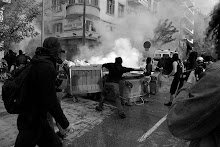It is obvious that State repression cannot be reduced to one single event but is a precise, continuous project that is constantly in act for the maintenance of social control. Although each repressive act is unique in its specificity and brutality, we must never lose sight of the real reasons behind particular arrests. The specific ‘crimes’ the comrades are associated with, and through which they have been framed and criminalised, are just one more occasion to liquidate social fighters and denigrate the struggle within the framework of democratic legality. Fabricated evidence and media sensationalism such as outside elements, terrorist links, etc. are classic dirty tricks from any manual of State justice. As well as keeping them out of circulation for as long as possible, such operations are aimed at offering the comrades on a plate as a symbolic sacrifice to placate the electorate. With any luck, those outside will lock themselves in a frontal, symbolic collision with the State, with all the odds on the latter. Or they could fall into the trap of the innocent/guilty dichotomy in the logic of the State’s legal apparatus, leading them down the cul de sac of court, technical defence and the delegation of the outcome to a judge or a jury. That being said, we do not reject the road of technical defence. But this is mainly the task of the lawyers, and can only marginally be inserted into the social struggle against repression which is both specific and generic at the same time. Action against specific acts of repression should not therefore be conceived as something separate from this reality, but rather as an extension and deepening of the struggle as a whole.
Naturally, there is no blueprint for the individual response to State repression. It is always up to arrested comrades to choose their own line of action: whether to appear in court or not, whether to have legal representation or not, the nature of our relationship with any others arrested, whether to make public declarations or not as the case may be. What is demanded of us here, as in any other situation, is coherence and the capacity to maintain an active dynamic within the struggle. This is all the more difficult as roads of communication with the outside world are often blocked or filtered through a whole apparatus of control and censuring. Our first and main task is therefore to remain true to ourselves and to our project of struggle as a whole, of which this is but one moment.
Anarchist solidarity is not therefore something private and separate from the rest of the struggle. We love and miss our comrades and want to snatch them back from the hands of the State, but that does not push us into the trap of mediation or expediency, which would block the road to the wider attack against the organs of exploitation and repression.
The problem of methods comes to the fore. There must be a logical thread running between the methods we use when pushed by specific cases of repression and the struggle against the organs of repression as a whole. A macroscopic repressive event can reach a wide spectrum of the movement, sometimes leading to defence committees or similar situations, often less formal but following the same logic. Differences are apparently buried in the interest of the higher cause, that of getting the comrades out of the clutches of the State. This can lead to an involution of the struggle, as all decisions must have the consensus of the whole assembly, thus reaching the lowest common denominator. What was before a heterogeneous, often conflictual, but rich, situation, can become unidimensional. Comrades quickly tire of the repetitive ritual of ineffective symbolic gestures carried out with minimal risk and little passion. Analysis and debate give way to a situation of waiting for the next move of the State.
Another road that response to repression can take is that of focussing on the personality of the arrested comrade or comrades. The attack on the State recedes into defensive positions, where comrades have the role of public figure thrust upon them with all that this entails. In the first place that of being an exemplary character, in the second, a victim. Without realising it, we slip into the logic of good and bad, not guilty and guilty. In this way we put an onus on the comrade in question, unwittingly presenting him or her as representative of the movement, through whom it also becomes judged by all the organs of representation. In the recent and not so recent past, this kind of solidarity has led to disastrous results for all those involved.
Subscribe to:
Post Comments (Atom)




No comments:
Post a Comment